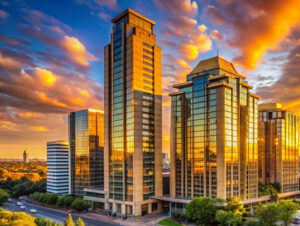- Perspective – March 2025
- Market Intelligence
- State of the Stainless Nation
- Sassda News – Push to boost Local Stainless Steel
- NDE Advert
- Sassda News – Inaugural Root Cause Analysis Conference Africa 2025
- Professional Profile : Bradley Klassen
- Technical FAQ
- Fastenright Advert
- Member News
- Project with Potentials – South Africa
- Project with Potentials – Nambia
- Focus Feature
- Member News – Enhanced Training Programme
- Sassda News – Eastern Cape Golf Day
SOUTH AFRICA’S NEW ERA OF DEVELOPMENT AND SUSTAINABILITY
South Africa is witnessing an unprecedented wave of infrastructure and energy projects, with investments spanning luxury real estate, renewable energy, and industrial development. These projects aim to reshape the country’s urban landscapes, strengthen energy resilience, and enhance economic growth...

Olympus Sandton: redefining urban living
In the heart of Sandton, Johannesburg, the Olympus Sandton is emerging as a landmark mixed-use development. Valued at over R2-Billion, the project will feature two grand towers housing more than 400 luxury apartments, alongside premium office and retail spaces. This visionary project is set to transform Sandton into South Africa’s premier neighbourhood, integrating residential, commercial, and leisure spaces seamlessly. Designed by a collaboration between Clarke Hopkins Clarke (Australia) and South African architects, Olympus Sandton focuses on sustainability and modern design, positioning itself as a future-forward urban destination.
Riversdale Solar Energy Project: powering a greener future
The Riversdale Solar Project, backed by the Western Cape Government, is another major stride toward sustainable energy. This 10 MW solar photovoltaic (PV) system will generate approximately 15 million kilowatt-hours annually, supported by an advanced Battery Energy Storage System (BESS) capable of storing 10 MW-hours of energy. By reducing reliance on Eskom, the project promises affordable, renewable energy to the Riversdale region, fostering economic growth and job creation. The initiative aligns with South Africa’s national drive to diversify its energy mix and increase renewable power generation.
Suiso’s Mega Coal-to-Fertiliser Plant: industrial expansion in Mpumalanga
Suiso Company is making a massive $1.7-Billion investment in a coal-to-fertiliser plant in Kriel, Mpumalanga. Set to begin operations in 2029, this 900-hectare facility will produce 1.5 million tons of nitrogen-based fertilisers annually. Additionally, the project will generate 234 000 tons of zero-sulphur blue methanol per year, promoting cleaner industrial practices. With the feasibility study completed, the construction phase is expected to commence in February 2025, positioning Mpumalanga as a key player in the global fertiliser market.
Source: AfricaHouse www.africainfo.co.za

